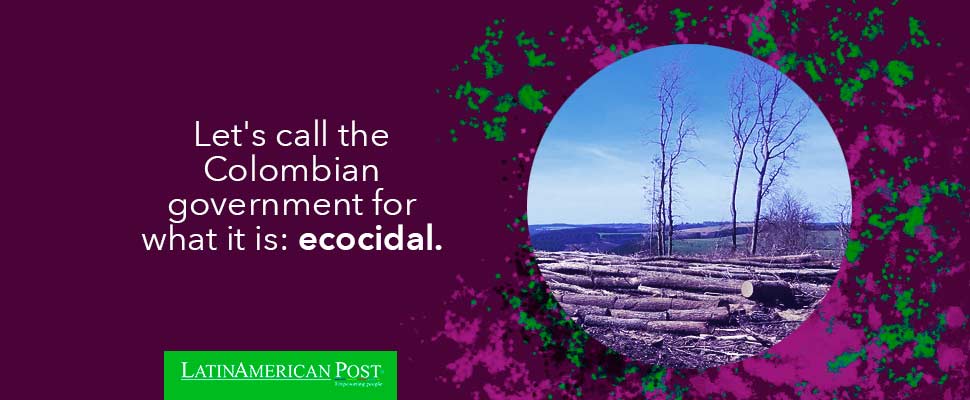Ecocide in Colombia: The Hypocrisy of Ivan Duque
Ivan Duque’s goverment is full of hypocrisy when it comes to enviromental protection
Ivan Duque’s goverment is full of hypocrisy when it comes to enviromental protection

Let’s call the Colombian government for what it is: ecocidal. Photo: LatinAmerican Post
LatinAmerican Post | Vanesa López Romero
While the international community praises the government of Iván Duque, president of Colombia, for its commitment to the environment and Venezuelan migration, the Amazon is on fire in the country and the disappointment of Colombian environmental leaders is palpable.
By February 9 there were already 21 murdered social leaders, several of whom were affiliated with environmental causes and sought to protect their communities and ecosystems. That same week the Government publicized the Environmental Crimes that would be punished in the country and days later a wanted poster came out with 17 people belonging to a FARC dissidence who are accused of illegal deforestation. On February 12 they were charged for the first environmental crime. This is Marco Aurelio Quiroga Tovar, who was accused of having deforested 83 hectares of the Serranía Los Pinachos National Natural Park (PNN) for livestock activities.
But while this was happening and it seemed that the State was putting a stop to activities that endanger environmental health, Resolution 110 of 2022 had already been presented and approved. This resolution is an update to a law that allows exploration and exploitation in natural reserve areas. In principle, resolution 110 was presented as a simple update to improve the rules of this law, but if we look at it more closely we will realize that the procedures are actually made more flexible to make it easier to carry out the exploration and exploitation of these areas. So much so that the Canadian mining company Rugby Mining Limited celebrated the decision in a statement and announced that in April this year it will begin its exploration in forest reserves in Chocó.
What about the environmental crimes?
With these facts, one wonders what the game is like, why environmental protection applies to some and not to others. To understand the answer, we must go back to the law that allows exploration and exploitation in forest reserves to stop at that term: “forest reserves”.
In Law 2 of 1959, the figure of Forest Reserve was created to protect certain areas of the country from extractive activities. But the law also allows this protection to be limited if the company that will carry out the activities demonstrates that they will have a public utility. If it is proven, and after carrying out studies, the authorities can eliminate the figure both temporarily and permanently so that the activities can be carried out. In other words, since the very creation of the law, the figure of the Forest Reserve has not been fully protected and is exposed to changes.
Also read: Should we Worry about Hunger in Colombia?
So what is clear to us is that even when Over more than 60 years, it has been possible to question said law to fully protect these forest reserves, this has not happened. Obviously, we must think that the current government not only has environmental interests, but also economic ones. But in the case of the Duque Government, which is also taking place in the midst of the climate and environmental crisis that puts the entire world at risk, there are two sides: the side that speaks of sustainable development at international summits, the side that receives environmental awards and that ferociously punishes environmental crimes in the country and the side that updates laws so that multinational companies only have it easier to carry out activities that are dangerous to environmental health as much or more than those carried out by FARC dissidents or ordinary people. Where is the commitment to the environment?
Let’s not forget that one of the facts for which Duque has been most acclaimed internationally is that he expanded the forest reserves. In addition, for this reason, he received a millionaire sum to continue expanding these areas. What will happen then is that the forest reserve areas will increase, they will be protected from environmental criminals native to the country and companies like Rugby Mining Limited will be given the opportunity to fill out simple paperwork and start their extractive activities as soon as possible. possible.
The international community must stop praising Duque for his well-embodied mediocrity and take a closer look at what is happening in Colombia. Let’s call the Colombian government for what it is: ecocidal . At least the Bolsonaro government does not appear to be something it is not.





